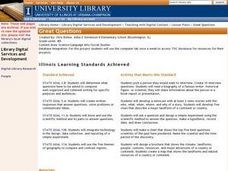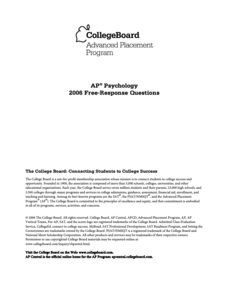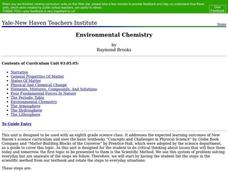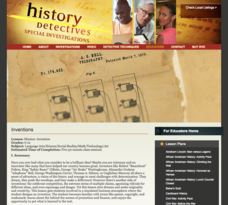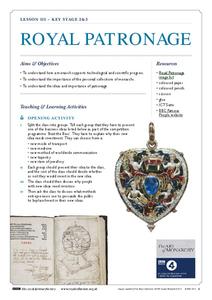Curated OER
The Mozart Effect
Music has been said to effect short term memory. Learners test out this hypothesis, graphing how knowledge retention in a biology classroom changes when music is played in the background. In the end, a better appreciation of the dynamics...
University of Minnesota
Dendritic Spines Lab
This is your brain on drugs ... literally! Your neuroscientists-in-training examine the evidence of drug use on the human brain and how neurons change their connectivity when altered by drugs. They then work together to create testing...
Curated OER
Designing a Study
Students explore features to consider when designing a scientific study. In this science research lesson plan, students examine different methods of data collection and consider which method would be appropriate for determining how many...
American Psychological Association
Do Cookies/Donuts Improve Memory? Errors in Methodology
If the methodology is skewed, the results will be skewed. That's the takeaway from an exercise designed to get class members thinking about research methods and statistics gathering. Instructors manipulate the testing environment to...
PBS
Predicting/Making a Hypothesis
Students analyze information from a variety of sources in order to create a hypothesis about the origin of an interesting family artifact.They create alternative hypotheses based upon available information to demonstrate that some...
American Psychological Association
A Tasty Sample(r): Teaching about Sampling Using M&M’s
Here's a sweet activity! As part of a study of psychological research methods and statistic gathering, individuals develop a hypothesis about the number of each color of M&Ms in a fun-size package. They then count the number of each...
Curated OER
Great Questions
Fourth graders research and create questions about a famous person. They create questions in a game format, create a computer generated brochure, and develop rubrics for their finished projects.
American Psychological Association
Research Ethics
Psychologists designing experiments to research human behavior must consider weighty ethical concerns. Class members act as members of an institutional review board and examine proposals to determine whether included provisions...
PBS
Predicting/Making a Hypothesis
As an introduction to the hypothesis and testing method of investigation, young history detectives engage in a special investigation of a family artifact. After watching a short video that demonstrates the method, they develop a...
Curated OER
Conveyor Belt Production
Students design a system that will move their glass product across a room in the plant. They must move the product 12 feet and their items cannot fall off at any time.
College Board
2006 AP® Psychology Free-Response Questions
A person wants to buy a car but is having a hard time making a decision. What is getting in the way? Learners turn to psychology to explain what is driving the ambivalence using materials from College Board. A second query asks scholars...
Curated OER
Population Density
Middle schoolers use the scientific method to conduct an experiment and use varied methods to gather background information. They correctly use lab equipment and prepare tables and graphs that organize, conclude, and present their...
Curated OER
Environmental Chemistry
Eighth graders are introduced to the topic of Environmental Chemistry. In groups, they review the steps within the scientific method and develop their own hypothesis and design an experiment. They solve equations related to the...
PBS
Inventions
Use this lesson plan to discuss inventions that have changed your class's world and have impacted society. Middle schoolers investigate important inventions of their time and design an invention in a simulated business atmosphere. Modify...
BBC
Royal Patronage
The relationship between European royalty and the artists, scientists, and philosophers they support has been a building block in the artistic and technological progress throughout the world. Learn more about patronage throughout the...
Curated OER
Questions About Rivers
Students investigate rivers. In this geography lesson, students work in cooperative groups to read about rivers from articles they have collected. Students form questions using Bloom's Taxonomy as a guide.
Curated OER
Can You See What I See?
Learners gain an understanding of the methods used to explore the earth's surface. Students create a time line leading to the first satellite image of the Earth that includes the various methods utilized to observe the earth's surface.
Curated OER
An Arctic Expedition
High schoolers become familiar with the Arctic region and the difficulties of scientific research by designing and developing an expedition to an "unknown" place. They use the library and the Internet in order to do their research. ...
Curated OER
Farming in a Fishbowl: How Ethnic Groups in
Seventh graders research Chinese agricultural needs and practices. They conduct an experiment with aquaculture and germinated rice as they take measurements and apply the scientific method.
Curated OER
Creating a Primary Source Archive: All History Is Local
Students explore personal, local, state, and national history. In this historiography lesson, students search the Library of Congress digital collections for primary sources regarding their family histories framed in local, state, and...
Curated OER
Andy Warhol and Silkscreen Pop Art
Students explore art history by researching famous paintings on-line. In this Andy Warhol lesson, students discuss who Warhol was, his impact on popular art and methods of painting. Students examine his use of silk screen printing and...
Curated OER
Predicting: Making a Hypothesis
Students analyze information from various sources to create a hypothesis about the origin of a family artifact. Students create a hypothesis about the origin of the item and write a paragraph explaining why they believe the hypothesis is...
Curated OER
U.S. History: de Soto's Alternate Route
Eighth graders examine various maps associated with Hernando de Soto's expedition. By comparing their textbook maps with newer maps, they answer a battery of focus questions. Using Microsoft Word, 8th graders answer the questions...
Curated OER
Lewis and Clark: The Language of Discovery
Students replicate some of the trailblazing methods of Lewis and Clark on a fifteen-minute "writing journey" through the school or neighborhood.






